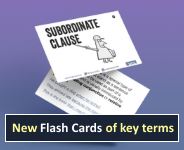Tense in narrative: Activity 1
Activity 1: Tense consistency
Look at the following short passages. For each one, identify where the tense changes incorrectly, and then write a correct version which continues with the tense used at the start of the passage.
»
- Printer-friendly version
- Log in to view or leave comments


